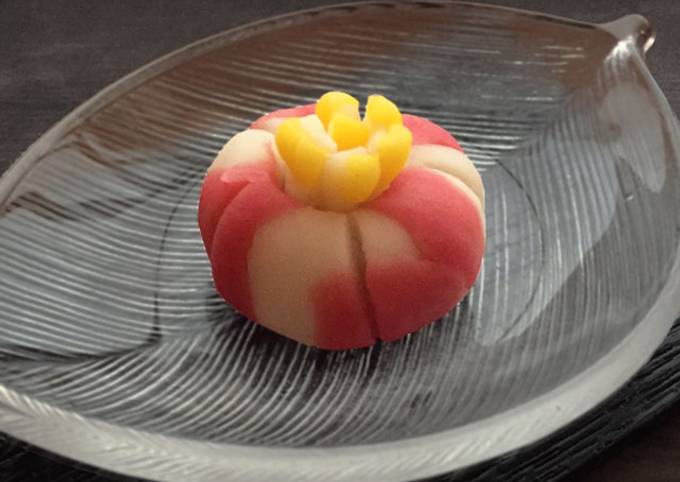Recette: Appétissant Nerikiri Wagashi: "Tsubaki" (Camellia)
Nerikiri Wagashi: "Tsubaki" (Camellia). Great recipe for Nerikiri Wagashi: "Tsubaki" (Camellia). "Tsubaki" (Camellia) is a flower early spring. It's one of indispensable flowers for decorating "Cha-shitsu";a traditional Japanese tea rooms. Try to make "Tsubaki flowers" with Nerikiri and Kuro-an.
 Nerikiri Wagashi: "Tsubaki" (Camellia) Koshi-an (red bean jam) • Nerikiri-dough • Please refer to "Example: how to make a Dough for Nerikiri-Wagashi (with wheat flour)" • Food colorings (red and yellow) This month's Wagashi confectionery is flower and bird shaped. Tsubaki, camellia flower and Uguisu, Japanese bush warbler both symbolise the coming of spring. These are Namagashi, wet/fresh confectionery, and the Namagashi made from Nerikiri dough, or smooth sweetened white bean paste is called Nerikiri. Vous pouvez cuisiner Nerikiri Wagashi: "Tsubaki" (Camellia) utilisant 4 Ingrédients et 11 instructions. Voici comment vous réalisez ça.
Nerikiri Wagashi: "Tsubaki" (Camellia) Koshi-an (red bean jam) • Nerikiri-dough • Please refer to "Example: how to make a Dough for Nerikiri-Wagashi (with wheat flour)" • Food colorings (red and yellow) This month's Wagashi confectionery is flower and bird shaped. Tsubaki, camellia flower and Uguisu, Japanese bush warbler both symbolise the coming of spring. These are Namagashi, wet/fresh confectionery, and the Namagashi made from Nerikiri dough, or smooth sweetened white bean paste is called Nerikiri. Vous pouvez cuisiner Nerikiri Wagashi: "Tsubaki" (Camellia) utilisant 4 Ingrédients et 11 instructions. Voici comment vous réalisez ça.
ingrédients de la recette Nerikiri Wagashi: "Tsubaki" (Camellia)
- C'est 10 g of Koshi-an (pâte d‘haricots rouges sacrée).
- C'est 20 g of Nerikiri pâte.
- Vous avez besoin of Veuillez trouver mon recette <<"Pâte pour"Nerikiri Wagashi (des confiseries traditionnelles japonaises)>>.
- Préparer of + Colorant alimentaires.
The paste is usually coloured to be formed into motifs of the season. Beni-tsubaki - made of white beans, sugar, and yam imitating red camellia (東京すごろく) Japanese red camellia in white snow is a typical sight in winter in Japan. Winter Sweets made of white beans, sugar, and yam imitating a leaf with sweet red bean paste in it (www.tamachi-baigetsu.co.jp) It expresses winter leaves. nerikiri with almond, chocolate azuki red bean smooth an paste. Shita Moe Plant Sprout Emerging From the Soil nerikiri with matcha green tea an bean paste.
Nerikiri Wagashi: "Tsubaki" (Camellia) petit à petit de recette
- Ingrédients pour 1.
- Ustensiles.
- Pétrir cette Nerikiri pâte bien. La partager en chaque pièce..
- Coloriser une petite pièce pour des étamines jaune..
- Coloriser une petite pièce pour des pétales rouge..
- (Toutes les pièces sont complètes).
- Faire des pétales. Faire la pâte blanche cercle. Partager la pâte rouge en 7 ou 8 et les mettre sure la pâte blanche. Envelopper une pâte d‘haricots rouges avec elle..
- Faire 5 fosses de bas à haut. (La partager en 5 égal).
- L'écraser un peu. Faire une cavité ronde dans le centre..
- Faire des étamines. Faire la pâte blanche rectangle et la pâte jaune bande. Les joindre. Faire des incisions. La retourner et rouler..
- Mettre la pièce étamines sur le centre de le fleur..
Hakubai White Plum Flower Japanese sponge cake with hint of sour plum and red bean paste + pink white an jelly. Tsubaki Mochi Camellia Flower Domyoji flour mochi with smooth red bean paste Flower: Tsubaki (camellia) Month: January Wagashi type: Domyoji manju Flower: Ume (plum blossom) Month: February Wagashi type: Konashi Flower: Momo Month: March Wagashi type: Kinton Flower: Sakura (cherry blossom) Month: April Wagashi type: Nerikiri Flower: Tessen (clematis) Month: May Wagashi type: Uiro Flower: Ajisai Month: June In my previous post, I explained how to make nerikiri, a combination of sweet white bean paste (shiro-an) and rice flour (shiratamako) that is the basis for a whole category of traditional Japanese sweets. Once you get the hang of neriki, this camellia blossom wagashi is a cinch to make. Once you get the hang of neriki, this camellia blossom wagashi is a cinch to make. Ouside a dought made from sweet white bean paste, shiro an.
Comments
Post a Comment